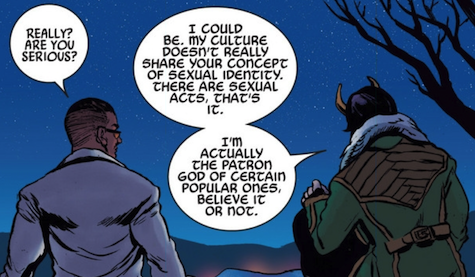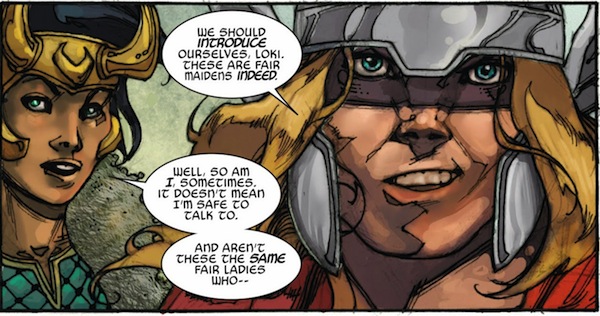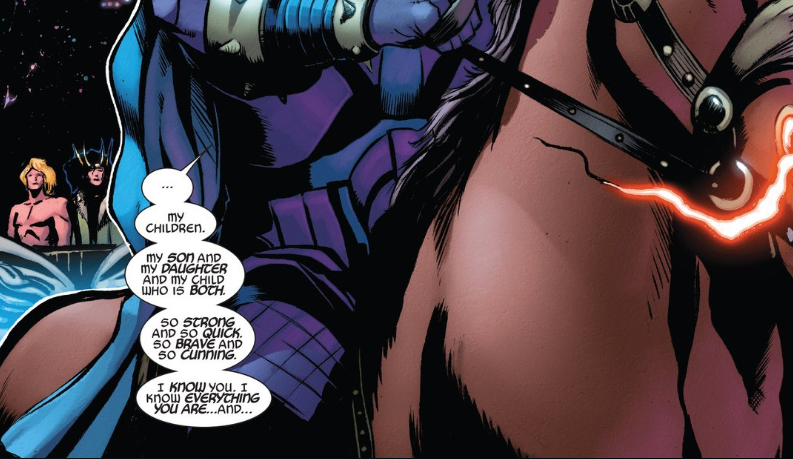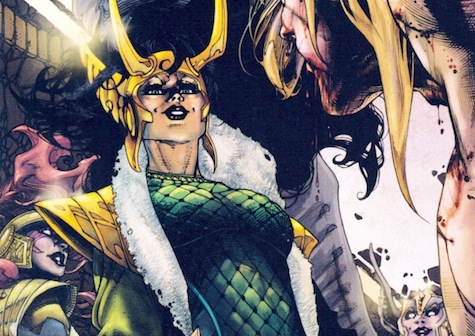Loki’s current exploits in the Marvel universe have been fun for sure, ranging from heists and cons to discovering that he and Thor have an extra sibling they never knew about. Writer Al Ewing made a splash even before his run with the character began by stating that Loki is bisexual, and that he would shift from male to female on occasion as well. The announcement was met with a flutter of interest and many questions—had Loki always been bisexual? What would the swapping mean for his gender identity? Would this add dimension to the character, or come off hollow?
It seems as though Ewing has done more than make Loki bisexual, however; with the Original Sin arc (by Ewing and Jason Aaron), it looks like Loki has been established as genderfluid as well. Which is awesome.
This was what Ewing said in response to a fan on Tumblr before the launch of Loki: Agent of Asgard:
“Yes, Loki is bi and I’ll be touching on that. He’ll shift between genders occasionally as well.”
When this was announced, the primary focus seemed to center on Loki becoming canonically bisexual. There were discussions about whether or not he had always been, what evidence there was for it, how genuinely the character would be rendered, whether or not it was a bad idea to have yet another “villain” who embodied queerness. (Disney villains are famously codified as gay, after all, and Loki is now owned by Disney.) The sexuality aspects seem to have been handled well, so far. Before Ewing even started with the character (back during his run in Young Avengers), Loki pointed out that Asgard does not set much store by sexual orientation; for Asgardians, there are simply sex acts, and Loki’s not exactly shy when it comes to that. When the character is an alien from an entirely different planet, it’s nice to see these topics get handled in a manner that doesn’t have to conform to humanity’s way of thinking.

In response to the ability to “shift gender,” many people started tossing around the term genderfluid, and it was often used incorrectly; genderfluidity or genderqueerness is not about a person’s physical body, it’s about their gender identity (and can be tied to their gender expression). Gender identity is not dependent on sex characteristics. With that in mind, calling Loki genderfluid just because he is able to change his sex characteristics from (traditionally identified) male to female is incorrect.
It has never been made fully explicit just what Loki thinks of his ability to switch sexes, though fans have wondered about it for some time. Often, the swap is part of one form of trickery or another (such as when Loki stole Sif’s body following Ragnarok, pretending he had simply been reincarnated female), and the character has never gone into depth about his gender identity. But in the Original Sin run starring Thor and Loki, there were a few specific tells that may have been intended to confirm Loki as specifically genderfluid.
**Spoilers for the Original Sin: Thor and Loki: The Tenth Realm comics arc from here on.
Thor gets himself captured in the long-isolated Tenth Realm, Heven. It is a place occupied and ruled by angels, with a female-run caste system. Their queen recognizes certain similarities between Loki’s past and her people, and encourages him to turn against Asgard and his brother in order to achieve something he has never had before: a family. Loki appears to offer his services, becoming female-bodied to belong in this society of women and gaining the title “Mistress of Strategies.”

When the change occurs, everyone refers to Loki as female. That is incredibly relevant; despite the fact that Loki may display female sex characteristics during those switches, that does not prevent Loki from being male (as a gender identity and gender expression)… unless he does not personally identify as male while occupying his female body. The fact that everyone—including Thor—address Loki as female while she’s occupying that body would seem to indicate a preference on Loki’s part.
It’s important to note that this is different than it would be addressing genderfluidity in a human, as genderfluid human beings do not have the ability to change their sexual characteristics depending on what gender they are currently feeling. In fact, some genderfluid humans might not be interested in switching body characteristics, even if they had Loki’s ability—it’s a complicated subject. But as it is being addressed in Loki, the fact that everyone around her switches pronouns and she doesn’t dispute it is an indicator of sorts.
In addition, see the panel shown above. Thor is talking about chatting up some fair maidens; Loki comments to Thor that occasionally he is a fair maiden himself, but that doesn’t mean he should be considered approachable. The trickster never says that he appears to be a maiden, but simply is.
That does not make the argument cut and dry—this has happened in comics with Loki before, particularly when he was occupying Sif’s body. (Though this was likely due to the fact that everyone assumed Loki had been brought back to life “as a woman” in that body.) But a comment by Odin toward the end of the Original Sin arc is a bit more specific. Thor and Loki are talking about their sister, with dad in earshot. Loki has retained her female body for the duration of the journey. Odin—classically not the warmest or fuzziest parent in the Marvel Universe—has a moment where he stops to think about how much he loves his kids. And when he talks of them, he refers to them as “My son and my daughter and my child who is both.” [Emphasis mine.]

That wording right there. That is exactly how someone who is sensitive to their child’s genderfluidity might refer to them. (And it’s coming from Odin, which is all kinds of teary-making because, wow… who knew the All-father had it in him to be this cuddly and accepting?) If Loki had the ability to simply change physical form, but still felt like a man, then that wording would be incorrect, a mislabel. But Loki doesn’t indicate that—if anything, she seems taken aback to hear such loving words from her adoptive father.
If this is what we’re meant to glean from the Original Sin arc and what follows, then that likely makes Loki the most prominent comics character who falls within the realm of genderfluidity. There are very few other examples—the most well-known up to this point would likely be the Skrull Xavin, who notably also has the ability to shift physical form. (I am not counting Mystique here because I cannot recall a point where Mystique ever identifies as anything other than female, but I could be mistaken.) This could be a bump in visibility for people who exist outside the typical gender binary, and it’s to be hoped that this gets addressed a bit more roundly in future arcs.
All artwork from Original Sin by Simone Bianchi.
Art from Young Avengers by Jamie McKelvie.
Emmet Asher-Perrin really wants Loki to talk about this more with Verity. You can bug her on Twitter and read more of her work here and elsewhere.











Worth noting here is that in the original Norse myths, Loki is the mother of Sleipnir.
@1, I was going to bring that up!
Considering that mythological Loki’s children are a giant wolf (Fenris), a giant serpent (Jormungand), a woman who’s half corpse (Hel), and the aforementioned Sleipnir, who’s an eight-legged horse, gender seems like a minor consideration when discussing Loki’s sex life.
True, Loki does all sorts of things in the original mythology, but the comics version of him has been around for decades without Marvel ever going there. So… it’s still a big deal.
Earlier this year I had an opportunity to chat with X-Men writer Chris Claremont. He told me that his original plan for Nightcrawler’s parentage was that Destiny was the mother and Mystique his father.
That would have been so much better than what we actually got.
“When the change occurs, everyone refers to Loki as female. That is incredibly relevant; despite the fact that Loki may display female sex characteristics during those switches, that does not prevent Loki from being male (as a gender identity and gender expression)… unless he does not personally identify as male while occupying his female body. The fact that everyone—including Thor—address Loki as female while she’s occupying that body would seem to indicate a preference on Loki’s part.”
Surely it indicates that “he” and “she” refer specifically to physical sex, rather than any vaguely-defined ‘gender identity’. Physically male -> “he”, physically female -> “she”.
Those were the pronouns I preferred when I took male or female characters in World of Warcraft, too.
If I woke up in the morning and found myself in the body of a woman, I would think it perfectly natural that people would refer to me as “she”.
It’s a big win that we’ve now taken a group of people (beings?) we don’t understand and boxed them in with our narrow views of sexuality, even though they’ve outright said they don’t conform to anything close to what we do.
This is another great lesson for comic readers: no matter how different someone is, you can always redefine them to fit your perspective instead of learning theirs.
@7: If this were a group of real beings that were being treated this way, that might be a concern. Since they’re fictional beings whose beliefs, attitudes and actions are the result of creative acts from humans, then why shouldn’t the work of fiction be examined in light of human concepts?
“It’s nice to see these topics get handled in a manner that doesn’t have to conform to humanity’s way of thinking.”
Then proceed to article describing everything in terms of some modern human ideas of gender identity, and congratulate the aliens for conforming to it.
I can’t wait for the article about the issue where Loki gets knocked up by a stallion and gives birth to an 8 legged horse that he gives to his dad as a present.
@8 Because the whole point of the story arc, and of this article, is that there are always going to be beings (people?) that are different than us, and we shouldn’t automatically apply our narrow view. Asgardians, while fictional, represent a race with not only customs, but an existence completely different than ours. Rather than accept that, or try to expand our understanding to include their view (if even possible) we just place them in to our ignorant box.
Here’s the gender/sex arc summed up in one pass:
Bro-1: “Hey L0ki, you gay bro?”
Loki: “My race does not conform to your understanding of sex and gender. Our acts, let alone our existence, cannot be defined through such narrow lenses as your limited consciousness have managed.”
Bro-1: “…Ya bro, you gay.”
@10: The point of the article seems to be that Loki has been confirmed as genderfluid. (I’m just about to start reading the mini-series, so I can’t comment on what its point is just yet.)
I’m also not sure that I’d categorize the gender identity of genderfluid as an example of a “narrow view” or a “box.” Nor would I use that term to describe a mini-series that indicates that a major and beloved character (who also appears in a hugely popular film) is genderfluid.
If this is what Ewing is doing (as the article indicates), this seems to me a wonderful thing, expanding the variety of gender identities that are represented in the Marvel U. And then having Loki’s father speak supportively of that identity? That’s both lovely and important. (Parental support for non-cis gender identities can be a powerful thing in the real world.)
I think what you’re doing is you’re placing more value on metaphorical approaches to depictions of difference (in terms of sexual identity, gender identity, etc.) rather than on concrete approaches. Both approaches can be valid, of course, but Ewing seems to have chosen the latter. I don’t see why his choice is invalid, or why it’s the same as saying “Ya bro, you gay.”
And given that so many queer people (self included) have had to be satisfied with metaphorical approaches to depictions of queerness in comics and elsewhere, I think it’s refreshing and, again, important, to actually have characters that are more concretely depicted as having sexual and gender identities that are underrepresented, whether that mean bisexual characters, or genderfluid characters, or trans characters, or asexual characters, etc.
Marvel writer Brian Bendis commented on something similar earlier this week, in response to a question about gender identity of Ultimate Jessica Drew, who is a female clone of Peter Parker. He said: “I get a lot of questions about Jessica and the subject in particular. I think on behalf of her I would accept anyone gravitating to her for that reason, and I totally get it, but ultimate Jessica Drew was never intended to be a representative character because she is technically not. I think transgender and/ or fluid sexual people want real representation and not Marvel science-y gobbledygook clone representation. I hope that makes sense.”
I think he’s absolutely correct. It’s time for some real representation.
Or to put it another way, the value an Asgardian race who might, metaphorically, represent otherness (in terms of sexual identity, gender identity, etc.) is much, much less, to me, than the value of a Loki who has been concretely indicated to be both bisexual and genderfluid.
I was agreeing completely with you until I found out Odin said “My son and my daughter and my child who is both”. I mean if we’re talking gender (not sex) here then wouldn’t that make Loki bigender? None of this makes sense.
So is it possible that when Loki was talking about sometimes being a woman he was talking about sex and when Odin was talking about Loki being both he was saying Loki is bigender?
Bigender and gender fluidity are two very different things and by Loki saying that he’s somethimes a “maiden” he was implying he’s sex fluid (is that even a thing?) while Odin saying Loki is both he was implying Loki is bigender.
Please reply. :)
I think what we’re leaving out of the discussion is that Loki is gender fluid the way only a god could be. Unlike the poor mortals condemned to a form not of their choosing or slow incomplete methods of transitioning Loki can change forms at will. Thus the gender of Loki’s form goes a long way to indicating the preferred pronoun.
It’s also astute (as well as PC) of the authors to define gender as unimportant to the Asgardians. When one can change outward sex arbitrarily it would follow that inward gender would be somewhat arbitrary as well. Marvel makes some large departures from the source mythology, but I’m glad they’ve made Loki a step more true to themself.